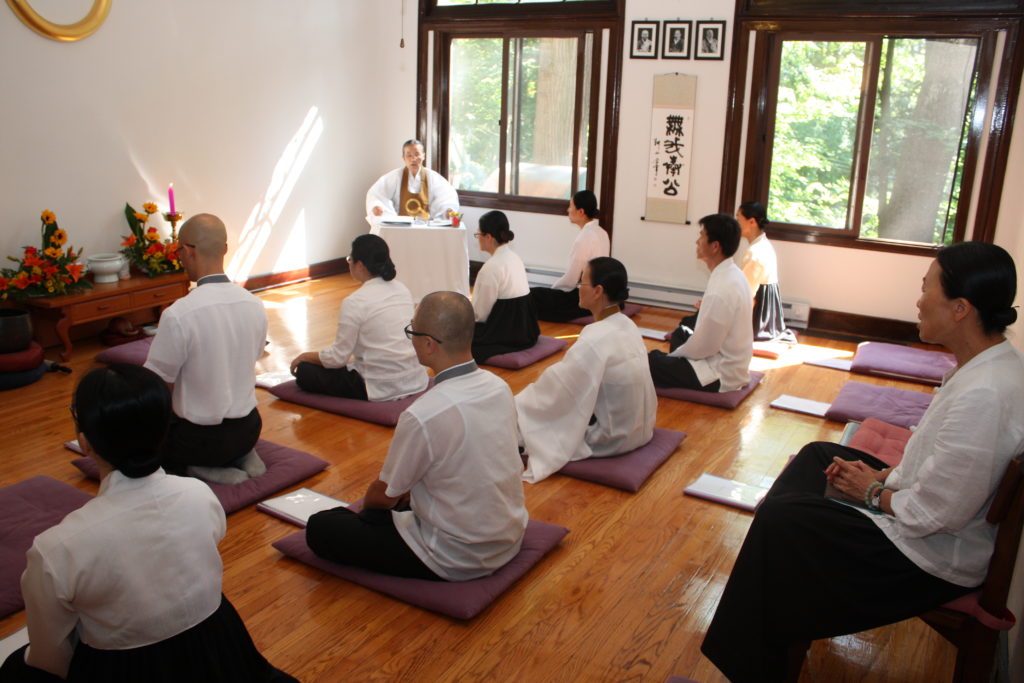by Rev. Grace Song, PhD

In this article:
- Timeless Son Approach
- Buddhism Classic Training
- Learning How to Stop
- Study Buddhism at Won Institute
Timeless Son Approach
Master Sotaesan, the Korean Buddhist teacher who founded Won Buddhism at the start of the 20th century, taught that Buddhadharma is daily life, daily life is Buddhadharma. We call this approach Timeless Son (Chi., Chan; Jpn., Zen). Timeless Son was created with the active person in mind: the parent raising children, the employee sending an email to her client, the farmer tilling the field, the student balancing a full course load with a part-time job, the teacher buying groceries after a long day in the classroom. Although many people may fantasize about the possibility of spending months up in the quiet mountains, sitting hours in meditation and seeking answers to essential life questions while they take a respite from everyday experience, we are beckoned to take care of our families, pay the bills, and continue our livelihood. Of course, a long-term retreat would provide an environment conducive to intensive spiritual practice, but how many of us can convince our boss to let us off work for three months, never mind one? If we can only practice by entering the mountains and sitting quietly, how could this be the dharma that can save all sentient beings?
Master Sotaesan warned against separating practice from daily life, especially in this ultra competitive and digitally active world. Practice needs to be weaved into the fabric of our lives so that every moment and place is an opportunity for practice and progression. Seated meditation on the cushion is only part of the practice to help us mindfully navigate our way through the many sensory conditions that we encounter throughout the day. What is most important, Master Sotaesan argues, is that we achieve freedom of mind, which we can do by awakening to our own nature and realizing that it is originally free from discrimination and attachment. This is precisely what Son practice is.
Buddhism Classic Training
He goes on to explain that for people who are first beginning to practice Son, the mind is not easily controlled according to their wishes. Classic teaching compares this to training an ox: If the reins of the mind are dropped even for a moment, it will instantly harm our commitment to the way. But with training, the mind gradually becomes tamed and will do what we wish. When at rest, we engage in practices such as seated meditation and chanting the name of Buddha to help us remove distracting thoughts and nurture the one mind, free of attachment.
Diamond Sutra
Ultimately, we need to be heedful in our actions and make choices with sound thought in all our applications. This is the mental state as expressed in the Diamond Sutra: “Give rise to a mind that, even while responding, does not abide anywhere.” The word heedful means to remember. A zen saying once goes: The most important thing is to remember the most important thing. So, if you really want to live a more mindful life, setting an intention and not forgetting is key.
Learning How to Stop
As you may have experienced, when we come up against something difficult we can get caught up in our egoic self. To help us widen our mind especially when we come across a difficult situation we need to learn how to stop. Stopping creates space and allows us to just notice what’s going on so that we deepen our presence. What arises is not a problem. It’s natural to react when faced with difficult situations. We can get angry, irritated, annoyed, frustrated- these are natural emotions that come up for us because we are obviously not insentient objects. Just realize this is the reality of the moment, and we don’t have to react. From a clear mind, we can then think through the situation, roll the thoughts, and then make a decision by discarding what is wrong and choosing what is right. Pausing gives us space and allows us to communicate trust and love. Victor Frankl once said, “Between the stimulus and the response there is a space, and in that space is your power and your freedom.” And the vaster the mind becomes, you start living from your most awake self.
The thought manifests the word;
Dhammapada
The word manifests the deed;
The deed develops into habit;
habit hardens into character;
and character into destiny.
So watch your thoughts with care,
And let them spring forth from love
Born out of compassion for all beings.
Study Buddhism at Won Institute
To study more about Won Buddhism click here.
That’s great teaching in our hectic daily life. Thanks